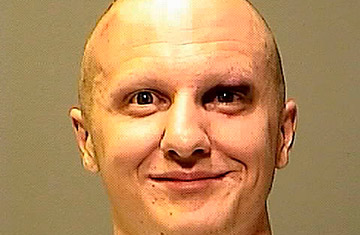
Jared Lee Loughner, the suspect in the attempted assassination of U.S. Representative Gabrielle Giffords, is shown in this U.S. Marshals handout photograph on January 10, 2011
The U.S. Marshals Service has released the first new photograph of Jared Lee Loughner to be seen since his arrest on Saturday, Jan. 8, for the shooting rampage in a Tucson, Ariz., mall. His head shaved, he sported a creepy grin, not wholly inappropriate for a man around whom, for the past 48 hours, stories have arisen of bizarre behavior and utterances — and who stands accused of killing six people and wounding 14 more, including Congresswoman Gabrielle Giffords, who was shot through the head and remains in critical condition in a Tucson hospital.
Loughner himself was not in Tucson but in Phoenix, where, just before the photograph was released, he was officially charged in federal court for the crimes of the weekend. Dozens of journalists were packed into two courtrooms, waiting for a chance to see him in the flesh. Some had signed up more than an hour before the 2 p.m. session for the privilege. (Those who didn't get seats were ushered into another courtroom to follow the proceedings on closed-circuit television; the overflow beyond that got to hear live audio on the ground floor.)
And so, on schedule, in Courtroom 302 of the U.S. District Court's Sandra Day O'Connor U.S. Courthouse, before Federal Magistrate Lawrence Anderson, Loughner, 22, made his first public appearance since his arrest. No photographers were allowed in, and there was no traditional "perp walk" to display the accused to the media. Only a sketch artist was allowed to capture images in the courtroom.
Loughner entered the courtroom handcuffed and wearing a tan prisoner's outfit. His face was expressionless, and his hair, like in the photo that would be eventually released, was down to a closely cropped stubble. With his back to the gathered media, he faced Anderson and listened as the judge read aloud the counts against him. The Tucson man faces up to life in prison for the attempted assassination of Giffords, the death penalty or life in prison for the deaths of Giffords staffer Gabriel Zimmerman and U.S. District Judge John Roll and up to 40 years in prison for the attempted murders of Giffords staffers Pamela Simon and Ron Barber.
Anderson advised Loughner of his rights to remain silent and to receive legal representation. He did not read aloud Loughner's signed financial affidavit — which he said would be sealed from public view — other than to acknowledge that the accused could not afford his own lawyer. When Anderson asked Loughner if he would like the government to appoint and pay for a lawyer for him, Loughner simply replied, "Yes."
His legal help was already next to him, in the person of Judy Clarke, a San Diego lawyer who represented Ted Kaczynski, the "Unabomber" who pleaded guilty to mail bombings in 1998, and Timothy McVeigh, who was convicted of the Oklahoma City bombing in 1995. It had been difficult to find someone in Arizona to represent Loughner. In court papers filed Monday, Jan. 10, Jon Sands, the federal public defender for the District of Arizona, said his office had turned down the opportunity after discussions with prosecutors because of the "gravity of the charges" and the possibility of the death penalty. "Other federal death-qualified counsel in the District have identified conflicts or declined representation," Sands wrote. His office did a survey of lawyers and consulted a national panel of lawyers specializing in death-penalty cases for advice. Its one Arizona-based member, Rick Lougee, said he was "unable" to take the case, Sands wrote. Eventually his office found Clarke and her associate Mark Fleming in San Diego. Reuben Cahn, executive director of the Federal Defenders of San Diego Inc., agreed to be appointed to the case with them.
Clarke told Anderson she would file an application to practice law in Arizona later in the day. She has until Friday, Jan. 14, to do so, Anderson said. However, it's unclear how long the case will remain in Arizona. All of the judges in the federal court's southern Arizona circuit — which was overseen by Roll — recused themselves from presiding over the case, forcing the legal proceedings to move elsewhere. Clarke told Anderson, "There is great concern with proceeding any further than today with Arizona judges."
Loughner waived his right to have a detention hearing. Defense lawyers typically use such sessions to lobby for leniency in the manner in which their client is held during the trial process. "I find by clear and convincing evidence that Mr. Loughner is a danger to the community," Anderson told the court. "He shall be detained until further order of the court." And so, for now, Loughner will remain in the custody of the U.S. Marshals Service. Just before adjourning, Anderson said, "Good luck to you, Mr. Loughner." His next appearance in federal court is not until Jan. 24.
